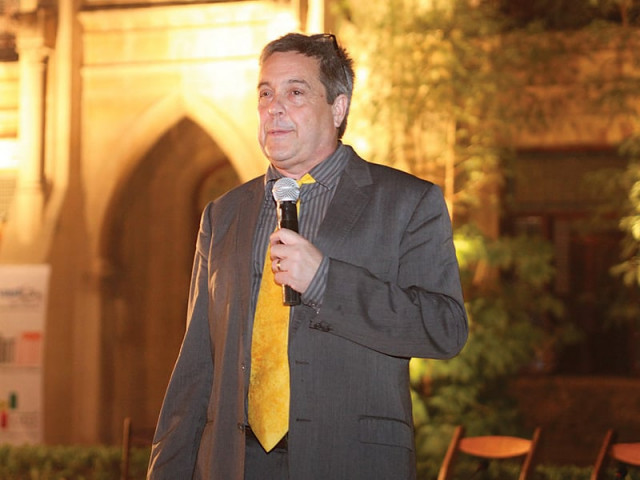Reforming education: ‘Application of creative practices in curriculum essential for learning’
Speaker stresses need to connect children with their work for them to feel accomplished.

The Creativity, Culture and Education (CCE) Executive Director Paul Collard speaks about introducing creative practices in curriculum at schools to improve the learning process at an event organised at Aman House on Thursday. PHOTO COURTESY: ARTNOW
It is essential to recognise the power of creativity in the learning process to prepare students for modern workplaces, according to the Creativity, Culture and Education (CCE) Executive Director Paul Collard.
The model places practitioners at schools for a period of time to explore the application of creative practices in curriculum, explained Collard at the Aman House on Thursday. “Everyone can draw but only a few can see.”

With an aim to make a difference, ‘Artists in Creative Education’ - an international programme by UK-based CCE has started working in Karachi after having delivered extensively in the UK and many other countries.
The event was organised in collaboration with Vasl Artists Collective, the British Council of Pakistan, IKON Gallery in the UK and the CCE, ArtNow and the Aman Foundation.
According to Collard, 60 per cent of the jobs children at schools will do in the future have not yet been invented. “How can we teach our children to prepare for a world that is changing so quickly?” he questioned.
Talking about the CCE project and its connection with the restive city Karachi, Collard was of the view that one can’t change a city famous for all the wrong reasons without engaging culturally. “One engagement with arts and culture is not enough. To have a permanent affect on children, they should be engaged with arts and culture everyday,” said Collard.
In his presentation, he explained that learning of art, drama, design, music, writing, photography and filmmaking could enhance teaching of mathematics and science and also generate a peaceful and collaborative environment for the children to learn.
Due to economic crises, the world is going through a fundamental change, he said. “The world wants job creators not seekers.” He said that attention was increasingly focused on the future of economic growth and particularly towards the creative industries and the knowledge economy.
The executive director of the CCE said it was vital to instill the belief among children that whatever they achieve is because of their efforts and not due to the system they follow. He said that connecting children with what they do was important, otherwise their achievement will have no meaning for them. “We should make sure that students leave schools with a set of skills because they can’t be in schools forever.”
Citing different issues being faced by the schools, he said that artists have been trained to help change the role of teachers, their activities, organisation of time, space, and approach to tasks. He added that space, for example, allows teachers to be more mobile and involved when needed. In addition, they are able to observe the impact on students.
The presentation was followed by a panel discussion with Emma Brown, a learning coordinator for IKON in the UK, artists - Shaheen Ahmed, Mahtab Hussain, Sara Khan, Sara Mahmood, an architect and a performing artist in the UK, Mariyam Iftikhar, and Bharti Patel.
The programme is being piloted in Pakistan as an international collaboration between Pakistan and the UK. The artists working on the pilot are trained in Birmingham schools. The artists have started assisting a few selected schools in Karachi already.
When students are physically, socially, emotionally and intellectually engaged, you get high results but improving results was not the only aim, said the panelists, adding that feelings should be considered while learning as schools are not emotionless zones.
“Children are so eager to share all over the world,” said Patel. He was of the opinion that the children could be productive when asked to take responsibility for their assignments.
Published in The Express Tribune, September 28th, 2013.



















COMMENTS
Comments are moderated and generally will be posted if they are on-topic and not abusive.
For more information, please see our Comments FAQ